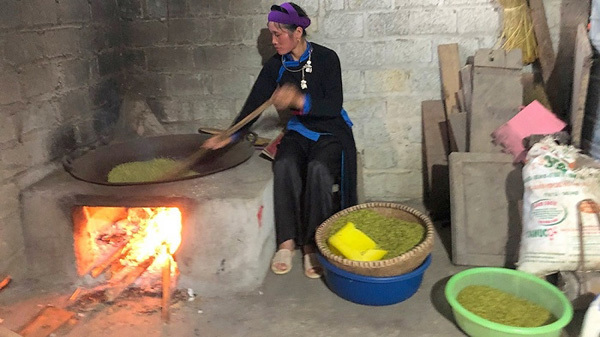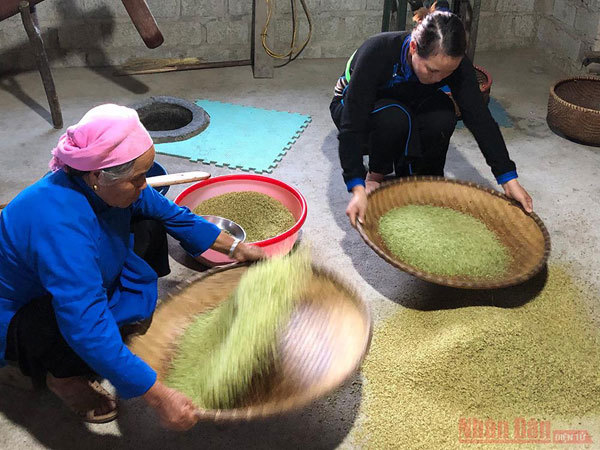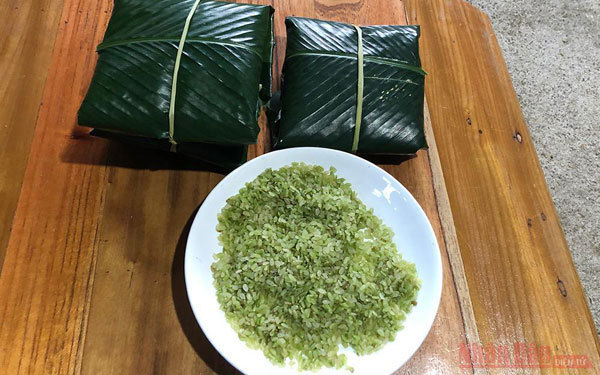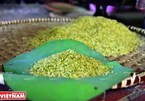 |
| Roasting young rice gains in a big cast-iron pan. (Photo: NDO/Tuyet Loan) |
According to elderly couple Lam A Nhoi and Vang Thi Yeu in Ban Lien Commune, the tradition of making ‘com’ is has been practiced by many generations of Tay ethnic people.
Lam A Nhoi said that when the new crop season comes, villagers pick a “blessed” day in the eighth or ninth lunar month to make ‘com’ together.
‘Com’ is not only an offering for Tay ethnic people to pay tribute to their ancestors but also a gift prepared by a newly-married bride to her family before she and her husband harvest rice.
As the climate in the upland areas of Bac Ha is quite cold, there is only one rice crop each year, lasting from the sixth to the tenth lunar months. The rice for making ‘com’ is an indigenous rice variety cultivated in the upland hills, making ‘com’ more sweet and fragrant than those grown on the plains.
In Ban Lien Commune, ‘com’ is only made for domestic consumption rather than being sold in the market. After being harvested, young rice grains are peeled and divided into small batches for roasting in a big cast-iron pan. The roasting process requires a lot of attention to ensure the grains are still green in colour and sweet in taste.
After being roasted, 'com' is poured into a rice mortar and pounded with a pestle and then winnowed until the husk is removed.
 |
| After being roasted, 'com' is poured into a rice mortar and pounded with a pestle and then winnowed until the husk is removed. (Photo: NDO/Tuyet Loan) |
Lam A Nang, son of Lam A Nhoi, said that as the making of 'com' requires a lot of time and work, Tay ethnic people in Ban Lien only make 'com' on rainy days when they are not busy with farm work. On such days, people will go to the paddies and harvest young sticky rice to make 'com' as a way to use their spare time efficiently.
Lam Van Ngan’s family – the owner of homestay Lap Xuan, is one of the families with most experience of making and selling ‘com’ in Na Lo commune. Every family member is in charge of a processing step, from peeling, roasting, pounding, and winnowing to packaging. During the peak season, Ngan even mobilises help from other relatives.
 |
| ‘Com’ is an interesting souvenir for visitors to bring home after their trip to Bac Ha District. (Photo: NDO/Tuyet Loan) |
The ‘com’ made by Ngan’s family is so delicious that the family receives many orders from customers across the country, including those from Hanoi, Hai Phong, and Ho Chi Minh City. The product is also vacuum packaged so that it can be stored for longer.
Thanks to the support of the Rural Economic Development Centre, many families in Bac Ha District have launched homestay services in order to greet more visitors to the locality. The making of ‘com’ was then selected as a tourist product which allows vacationers to try their hand at making a traditional dish. ‘Com’ is also an interesting souvenir for visitors to bring home after their trip. NDO

Young green rice – flavor of autumn
For over a century, people of Me Tri village in Tu Liem, Hanoi, have been making ‘com’. Visiting Me Tri in autumn, one can enjoy the scent of com (young milky rice) being dried all over the village.

Vietnamese food: Young sticky rice flakes
There’s been a drop in temperature the past few days, and that means autumn is here. But did you know this is also the time of desserts made from rice?